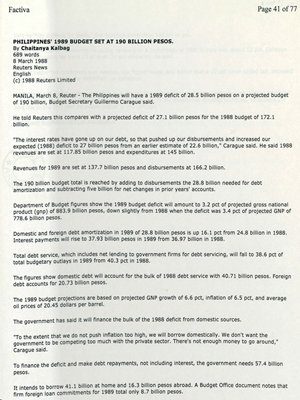PHILIPPINES’ 1989 BUDGET SET AT 190 BILLION PESOS
[Reuters]
Published date: 8th Mar 1988
8 March 1988
Reuters News
English
(c) 1988 Reuters Limited
MANILA, March 8, Reuter – The Philippines will have a 1989 deficit of 28.5 billion pesos on a projected budget of 190 billion, Budget Secretary Guillermo Carague said.
He told Reuters this compares with a projected deficit of 27.1 billion pesos for the 1988 budget of 172.1 billion.
“The interest rates have gone up on our debt, so that pushed up our disbursements and increased our expected (1988) deficit to 27 billion pesos from an earlier estimate of 22.6 billion,” Carague said. He said 1988 revenues are set at 117.85 billion pesos and expenditures at 145 billion.
Revenues for 1989 are set at 137.7 billion pesos and disbursements at 166.2 billion.
The 190 billion budget total is reached by adding to disbursements the 28.8 billion needed for debt amortization and subtracting five billion for net changes in prior years’ accounts.
Department of Budget figures show the 1989 budget deficit will amount to 3.2 pct of projected gross national product (gnp) of 883.9 billion pesos, down slightly from 1988 when the deficit was 3.4 pct of projected GNP of 778.6 billion pesos.
Domestic and foreign debt amortization in 1989 of 28.8 billion pesos is up 16.1 pct from 24.8 billion in 1988. Interest payments will rise to 37.93 billion pesos in 1989 from 36.97 billion in 1988.
Total debt service, which includes net lending to government firms for debt servicing, will fall to 38.6 pct of total budgetary outlays in 1989 from 40.3 pct in 1988.
The figures show domestic debt will account for the bulk of 1988 debt service with 40.71 billion pesos. Foreign debt accounts for 20.73 billion pesos.
The 1989 budget projections are based on projected GNP growth of 6.6 pct, inflation of 6.5 pct, and average oil prices of 20.45 dollars per barrel.
The government has said it will finance the bulk of the 1988 deficit from domestic sources.
“To the extent that we do not push inflation too high, we will borrow domestically. We don’t want the government to be competing too much with the private sector. There’s not enough money to go around,” Carague said.
To finance the deficit and make debt repayments, not including interest, the government needs 57.4 billion pesos.
It intends to borrow 41.1 billion at home and 16.3 billion pesos abroad. A Budget Office document notes that firm foreign loan commitments for 1989 total only 8.7 billion pesos.
“If the business climate does not deteriorate I think we can handle the deficit,” Carague said. “When you are in a take-off stage and trying to stimulate the economy, you have to go into a certain amount of deficit spending.”
He said preliminary estimates showed the 1987 budget deficit was slightly below the projected 25 billion pesos because some government agencies had been slow in spending budgeted funds.
“For 1988 we are in fact worried that we might exceed the deficit,” because government bodies are working hard to carry out projects for which they are responsible, Carague said.
Previously the budget office required extensive documentation before it released funds, he said. “But now we will keep on shoving the funds according to schedule because It is their responsibility to use those funds as long as they account for them.” But revenue generation had far to go.
Revenue efficiency, measured by taking revenue as a percentage of GNP, is very low, about 12 pct, Carague said. Other countries have 15 or even 20 pct efficiency, he said.
He said better tax machinery was needed, not higher taxes, and added that a 10 pct value added tax, imposed from January 1, had vastly simplified tax collection.
“VAT has a self-policing character. It is to a degree less dependent on the administrative machinery.” But VAT collections in 1988 might fall below projections. “Usually in the experience of other countries, collections are very low in the first year as people adjust to the concept.”






